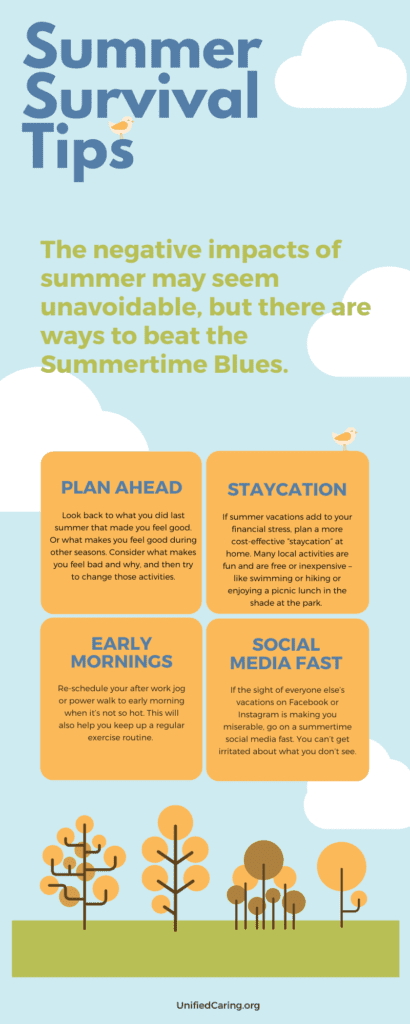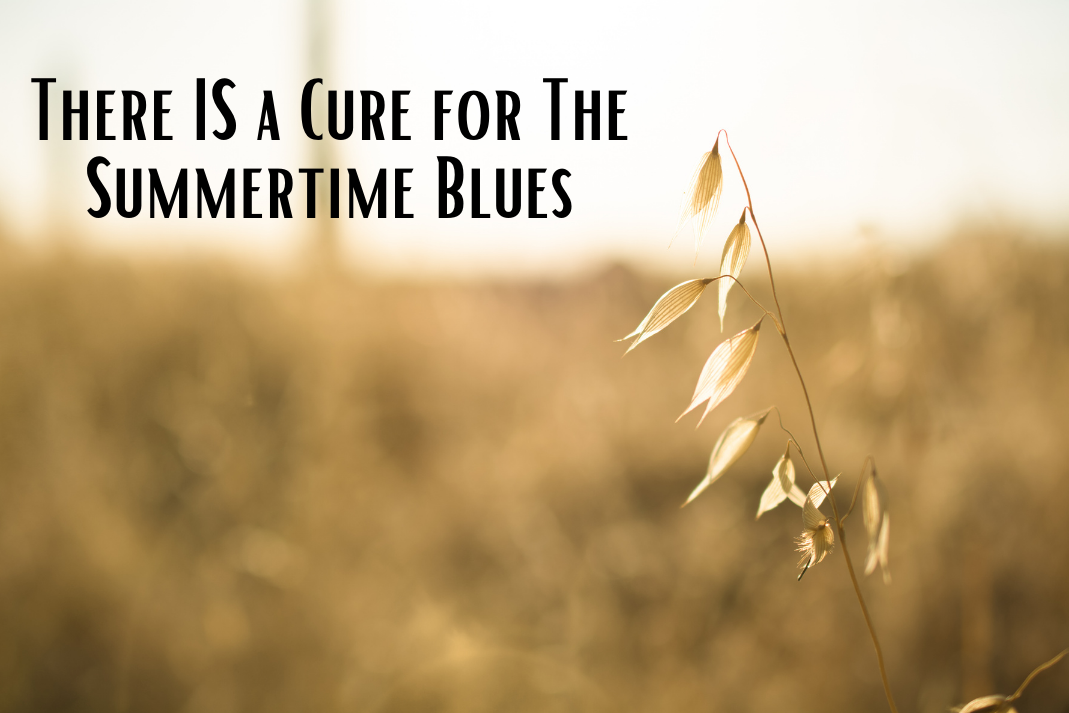Since the summer of 1958, when Eddie Cochran first sang “there ain’t no cure for the summertime blues,” many other artists (from The Who to Alan Jackson) have covered the song and kept it a staple on the radio.
But what are the “Summertime Blues,” and is it really true there is no known cure?
Long Hot Summer
Beyond popular songs, our culture consistently tells us that we should eagerly anticipate the lazy, hazy, crazy days of summer. Beach trips. Picnics. Grill Outs. Vacations. It may come as a surprise to some, but not everybody welcomes the arrival of summer. In fact, some dread those long daylight hours and soaring temperatures.
Seasonal Affective Disorder (SAD) is real, and it can make the summer months hard to endure for those who suffer from it.
SAD is perhaps best known as a major depressive disorder affecting about 5% of the US population during the cold winter months. When daylight hours shrink and the nights become long and cold, or snowy weather keeps people indoors, the body produces less Vitamin D (the so-called “Sunshine Vitamin”). All of which can affect metabolism and mood.
So while you may hear more about winter SAD, the Summertime Blues are real and Summer SAD (aka “reverse SAD”) affects people too.
Symptoms of Summer SAD
If you are someone you know has experienced winter SAD, the key symptoms are lower energy, oversleeping, feeling tired, and listless during the daytime. And for many, over-eating and weight gain is another hallmark of the disorder.
In the summertime, the symptoms of SAD are often the exact reverse – marked by an acute sense of restlessness and agitation. Instead of oversleeping, many suffer from insomnia and a lack of appetite, which causes unwanted weight loss. Sometimes summer SAD leads to significant anxiety and even anger.
Magazine covers, streaming services, and social media can also add to the stress, bringing on the FOMO effect – Fear Of Missing Out. Our smartphones fill with photos, texts, and tweets from people having “fun-in-the-sun.” For some, it might start to seem like everyone is at the beach, having a great time, leaving those stuck at home suffering from summer SAD feeling isolated and depressed.
Timing Is Everything
An abundance of sunlight plays a surprising role in the depression that springs from summer SAD. It’s rarely mentioned, but there is now some increasing awareness of the downside of too much light. The disruption of our internal circadian clock is the cause. An excess of bright light can slow melatonin production which our body needs to get ready to sleep, and this, in turn, causes insomnia.
As mentioned earlier, Vitamin D is called the “Sunshine Vitamin.” Its counterpart is the “feel-good hormone” known as serotonin – a precursor of melatonin. Decreased levels of melatonin due to too much of a good thing (the summer sun) impact our mood. Quite simply, the lack of sleep in the summer contributes to depression or depressive symptoms.
Hot Time Summer in The City
It may be hard for the sun worshipers among us to understand, but the high temperatures of summer can feel oppressive and uncomfortable for some. And for those who feel miserable, it is common to lose a gusto for eating. Systematic eating schedules help with regulating our moods. When schedules are disrupted, moods swings can occur.
While the higher temperatures of summer might make being outside more appealing, they can also negatively impact exercise routines. A Catch-22 is created when an effective cure for summer SAD is exercise, but the idea of going for a walk or run on a hot, humid day – or evening – is quickly shelved because the weather is intolerable.
It is widely accepted that active people are less depressed than inactive people. It is also believed that people who were once active and then stopped, tend to be more depressed than those who maintain or initiate an exercise program. It’s easy then, to see how the balmy summer can wreak havoc on mood.
In addition, hotter days can result in wearing fewer layers of clothing, which may be linked to potential body image concerns. Being invited to the beach for the weekend may make many people happy, but it could also trigger negative thoughts that make those with the Summertime Blues feel even more depressed or down.

Second That Emotion
The summer can be filled with many guilt-inducing “shoulds.” Allow yourself your emotions. If you feel shame in saying ‘I’m having a rough day’ in the summer, it’s probably because you are comparing your day with the fun and happy times it seems others are having during the summer.
Try to accept and honor the emotion, non-judgmentally observing what you’re feeling. Remind yourself that it’s okay to be down a little bit in the summer. The important thing is to not surrender to your sadness. Choose to take action instead. Focus on trying to do what you can to feel better.
Summertime Makes Me Feel Fine
When you feel the Summertime Blues coming on, a conscious, determined effort to change your mood can be effective. The best thing you can do is to purposefully go counter to what you’re feeling. Prepare to eat well and exercise. Lean on meaningful relationships with people who make you feel like you matter.
Practically speaking, consider black-out shades for your bedroom and lowering the air-conditioner at night to remain comfortable and uninterrupted by dawn’s early light. Try to go to bed at the same time every night to create a sleep-wake cycle you can stick with. Don’t underestimate the positive impact of drinking cool water along with regular cool showers in helping to reduce symptoms.
The summer version of SAD may be a depressive order, but it at least happens in a predictive pattern, so you can anticipate it and make a plan to treat the symptoms. As in most cases, it is often a good idea to consult the wisdom of our elders. Moderation is a powerful cure. As grandma used to say: “Some sunshine is good for the soul, but I always make sure I wear a big hat.”
By Mark Smith, contributing author
We invite you to discover inspiring and effective ways to care for yourself and to serve others. Now more than ever, caring is what we all need most. Caring for ourselves. Caring for others around us. Life now demands caring, resilience, and compassion like never before. UCA resources are available to help include the Self-Care Center, Virtual Volunteering, radio show, publications and online store offering members huge discounts and always free shipping.

